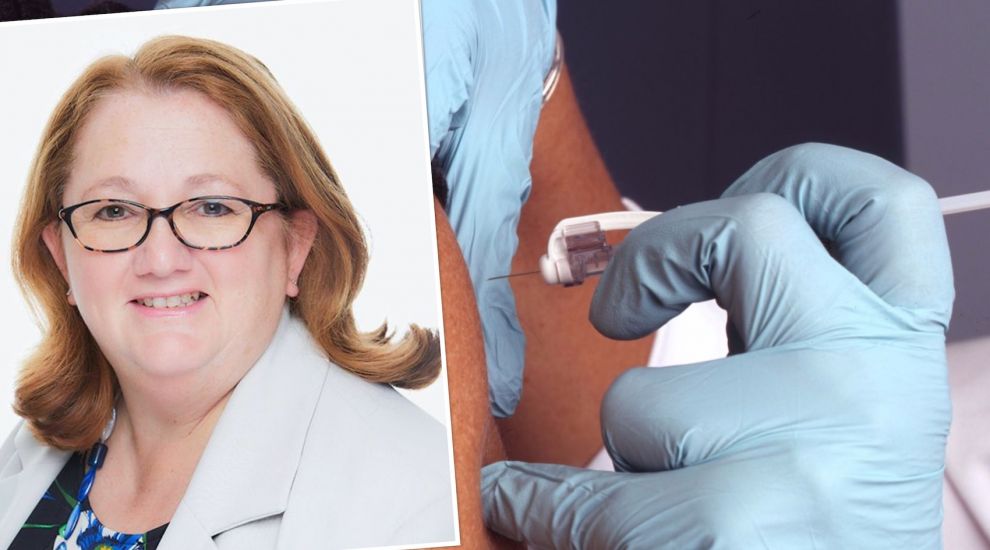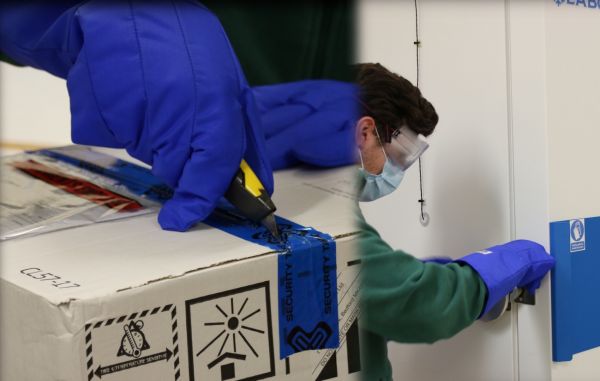

From consent to capacity... A local advocate has explained all the legal issues that need to be taken into consideration with vaccination, as care home residents receive their first covid-19 jabs this week.
Viberts' Managing Partner Zoe Blomfield shared her expertise with Express in this column...
"The news that a vaccination is available is a significant step towards a return to life pre-covid-19. We are told that the vaccine is effective, has been through a rigorous testing process and that there are no known dangerous side effects.
However, many people remain concerned about the fast-tracking of the testing process and there are perhaps unfounded rumours of potential dangers. It should be stressed that all official medical advice, particularly for the vulnerable, is to have the vaccination, however, this is a personal decision for each one of us to make.

Pictured: The covid-19 vaccine arriving in Jersey last week.
This is a fairly easy process, if not an easy decision, for those of us with mental capacity (the ability to make one’s own decisions). But what if you or a loved one have fluctuating mental capacity, or no capacity at all?
The making of a medical decision for a person who may lack capacity, for example if they have dementia or another capacity limiting illness, is a complex area of law. This is dealt with by the Capacity and Self Determination (Jersey) Law 2016 (referred to as ‘the Law’). This law is relatively new for Jersey and there are many areas of it that have not yet been fully tested or brought before the Court.
First and foremost, it would be the person themselves. The Law dictates that a person should be deemed to have mental capacity unless it is proven that they do not. Capacity is time and decision specific so a person who has previously been deemed to not have capacity, cannot be assumed to not have capacity for a future decision.
A person should be enabled and encouraged to participate in any decision before a decision is made on their behalf. Further, a person is not deemed to lack capacity just because they choose to make an unwise decision. This effectively means that a person, even with a capacity limiting illness or issue may be able to engage in the decision-making process, just so long as they have the capacity to do so in the given circumstances.
The law sets out that capacity is assessed in two stages, by firstly looking at whether a person has “a disturbance or impairment of the mind or brain.” This could range from a form of dementia, to learning difficulties, a brain injury or to an undiagnosed cognitive impairment caused by old age.

Pictured: Care home residents are the first islanders to receive the vaccine.
The nature of the impairment is unimportant, just that it would affect the person’s decision making on the issue in question. If the person has an impairment, then the second stage of the capacity test is relevant, and the person’s functional ability then needs to be assessed.
Functional ability is assessed as to whether the person can:
If a person is unable to do one of these four things, and cannot be enabled to do so, then they are deemed to lack capacity and they cannot make a decision on their own behalf.
Accordingly, looking at the decision as to whether or not to have the vaccine, the person would need to understand what covid-19 was and what the benefits of the vaccine would be. They would then need to be able to weigh up the pros and cons of having the vaccine and understand the potential benefits and the possible risks.
It should be noted again that even if the person comes to a conclusion that may seem unwise, it does not mean they lack capacity. For example, a perfectly rational and intelligent person may decide not to have a vaccination because of a fear of needles or a personally held belief about vaccinations. This may not seem like a wise decision, but if the person understands the potentially fatal risks involved in catching the virus then the decision is theirs to make.

Pictured: "...A perfectly rational and intelligent person may decide not to have a vaccination because of a fear of needles."
In addition, the person would need to be able to retain the information being given to them and being discussed for the duration of the conversation. For many, this may be a quick decision after a conversation of maybe less than a minute, others who have different views on the matter may require a longer conversation and therefore would need to retain the thread of the conversation throughout.
The person would also need to be able to reliably communicate their decision. Communicating the decision means that a person can by some means communicate their wishes, whether this be speaking, writing, a nod of the head, eye movement or such other means that is a reliable indication of their wishes. It is not important that the person may forget about the decision after the conversation, just that they can remember it for long enough to make the decision in question.
In this scenario, a best interest decision would need to be made on behalf of the person. Many may argue that it is in the best interest for a person and the community as a whole for everyone to have the vaccine. This may be true, but in this context a best interest decision is personal and subjective to each person.
Such a decision can be made by one person with authority to do so, for example by a Health and Welfare Attorney (under a Lasting Power or Attorney), or by a group of people relevant to the person, such as family and medical advisors.
Whoever makes the decision cannot supplant their own views for the views of the person. They must bear in mind what the person would have wanted if they could communicate their decision and also what is in their best interests. My mother, for example, would be very cross with me if I did not allow her to have it, as she has been an avid receiver of vaccines during her lifetime, and they have served her well. However, if she was ill at the time that she was offered the vaccine, it would not be in her best interests to have the vaccine at that time.
If the person did not have a Health and Welfare Attorney appointed and the decision was to be made by those effectively caring for the person, there is scope for disagreement, perhaps with the family. If there was disagreement over whether or not it was in a person’s best interests to have the vaccine, then an application could be made to the court for a best interest decision to be made by the Court on the matter. I recall being in involved in such an application many years ago in relation to the Swine Flu vaccine, so it can happen, as unlikely as we all hope this would be. The Court would then hear evidence from both parties and hear expert evidence as to what would be more likely to be in the best interests of the person and the Court would then make a decision.
The path to obtaining a person’s capacity and the steps that have to be taken by those effectively caring for our loved ones may not be well trodden but they are clear. I have this week seen the form that is to be used by those making the decision as to whether or not a person with potential capacity issues can consent to having the vaccine. It clearly puts the person first and encourages the process of the law to be followed to enable the person to make their own decision where possible."